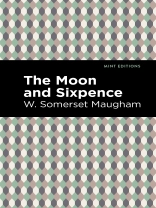The Moon and Sixpence (1919) is a novel by W. Somerset Maugham. Inspired by the life of French painter Paul Gauguin, Maugham set out to capture the disconnect between an artist’s desire to create and their obligations to their loved ones and society. Praised for its multifaceted portrayal of tortured genius and wasted talent, The Moon and Sixpence explores the distance between expectation and desire in a man whose decisions, however, hastily made, are done with the loftiest of intentions. Some people live their whole lives without daring to dream, going from moment to moment in a haze of dreary reality, following expectation from birth to grave. Strickland seems to be one of these people—singularly dedicated to his work as a London stockbroker, uninterested in the arts, married as though through obligation alone. One day, he unexpectedly leaves his wife and children to pursue a career as a painter in Paris, completely and irrevocably severing himself from the professional and familial ties he sent his whole life building. Somehow, he proves incredibly adept, but each brilliant work of art is made at the expense of those he leaves behind. The Moon and Sixpence is a tale of creativity, disappointment, and struggle by a master stylist with a keen sense of the complications inherent to human nature. This edition of W. Somerset Maugham’s The Moon and Sixpence is a classic work of British literature reimagined for modern readers.
Since our inception in 2020, Mint Editions has kept sustainability and innovation at the forefront of our mission. Each and every Mint Edition title gets a fresh, professionally typeset manuscript and a dazzling new cover, all while maintaining the integrity of the original book.
With thousands of titles in our collection, we aim to spotlight diverse public domain works to help them find modern audiences. Mint Editions celebrates a breadth of literary works, curated from both canonical and overlooked classics from writers around the globe.
About the author
W. Somerset Maugham (1874-1965) was an English novelist, playwright, and short story writer. Born in Paris, he was orphaned as a boy and sent to live with an emotionally distant uncle. He struggled to fit in as a student at The King’s School in Canterbury and demanded his uncle send him to Heidelberg University, where he studied philosophy and literature. In Germany, he had his first affair with an older man and embarked on a career as a professional writer. After completing his degree, Maugham moved to London to begin medical school. There, he published Liza of Lambeth (1897), his debut novel. Emboldened by its popular and critical success, he dropped his pursuit of medicine to devote himself entirely to literature. Over his 65-year career, he experimented in form and genre with such works as Lady Frederick (1907), a play, The Magician (1908), an occult novel, and Of Human Bondage (1915). The latter, an autobiographical novel, earned Maugham a reputation as one of the twentieth century’s leading authors, and continues to be recognized as his masterpiece. Although married to Syrie Wellcome, Maugham considered himself both bisexual and homosexual at different points in his life. During and after the First World War, he worked for the British Secret Intelligence Service as a spy in Switzerland and Russia, writing of his experiences in Ashenden: Or the British Agent (1927), a novel that would inspire Ian Fleming’s James Bond series. At one point the highest-paid author in the world, Maugham led a remarkably eventful life without sacrificing his literary talent.












